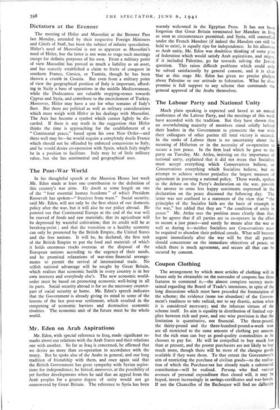The Labour Party and National Unity
Much plain speaking is expected and heard at an annual conference of the Labour Party, and the meetings of this week have accorded with the tradition. But they have shown that an overwhelming majority of members stand solidly behind their leaders in the Government to prosecute the war with their colleagues of other parties till total victory is secured. In the ranks of Labour there is no uncertainty about the meaning of Hitlerism or in the necessity of co-operation to secure a just peace. In the firm lead which he gave to the party on Tuesday, Mr. Attlee, insisting on the importance of national unity, explained that it did not mean that Socialists must accept everything which Conservatives believe, or Conservatives everything which Socialists believe, but an attempt to achieve without prejudice the largest measure of agreement in pursuing a national policy. These words, spoken in the debate on the Party's declaration on the war, provide the answer to some less happy sentiments expressed in the declaration on the peace discussed the following day. The latter was not confined to a statement of the view that " the principles of the Socialist faith are the basis of triumph in the war," but added that they are " the condition of unity in peace." Mr. Attlee sees the position more clearly than that, for he agrees that if all parties are to co-operate in the effort to secure a just peace—and surely he means after the war as well as during it—neither Socialists nor Conservatives must be required to abandon their political creeds. What will become urgent immediately after the war will be that all parties should concentrate on the immediate objectives of peace, on which there is much agreement, and secure all that can be secured by consent.


























 Previous page
Previous page